Back in February 2022, whilst lying on a sunbed in Cape Verde, my phone pinged. It was an email from Writing West Midlands with an opportunity that was not to be missed. After 25 years of teaching French to A Level, I had undertaken an MA in Translation Studies at the University of Birmingham in 2018. As part of the course, I had focused on literary translation through the writings of Annie Ernaux. I had then become involved with Writing West Midlands through their brilliant Birmingham Literary Salons, which each month invites a writer from ‘beyond the anglosphere’ to chat about their work and the literary climate in their part of the world. I was also a member of the West Midlands Literary Translators Network.
The 12-month residency was part of a project developed by translators Ros Schwartz and Daniel Hahn. It was a one-off literary translation residency based in Birmingham, funded by the Arts Council and run in partnership with Writing West Midlands and Aston University. The role was intended to encourage an interest in literary translation and translated literature and to promote languages among communities in and around Birmingham through workshops, talks and other public engagement as well as collaborative participation projects. My teaching career had revolved around raising the profile of languages and collaborative projects, so this seemed to be the perfect opportunity to combine both teaching and translation.
I was encouraged to shape the residency to meet my own interests whilst including work within the university, as well as collaborating with local partner organisations who had never previously worked with translation. Part of the remit was also to raise the profile of languages and translation at literary festivals and other arts organisations.
Community poetry translation workshops Birmingham has a lively arts scene, with many organisations working with youngsters in difficult areas of the city from a wide range of socio-economic backgrounds. I was aware of the Northfield Arts Forum (NAF) through their community choir. It is a collective of artists that nurtures creativity and community spirit across the Northfield constituency. Sessions started at their base, a former shop in the Grosvenor Shopping Centre and expanded to community groups, including a Birmingham Youth Service project based in Kings Norton and local Boys’ Brigade and Girls’ Brigades. The level of engagement with the activities was exciting to see. A final session was held at a Sixth Form College in Dudley LEA, aimed at students currently studying French and Spanish at A level – the next generation of linguists, and there was no shortage of talent in the cohort.
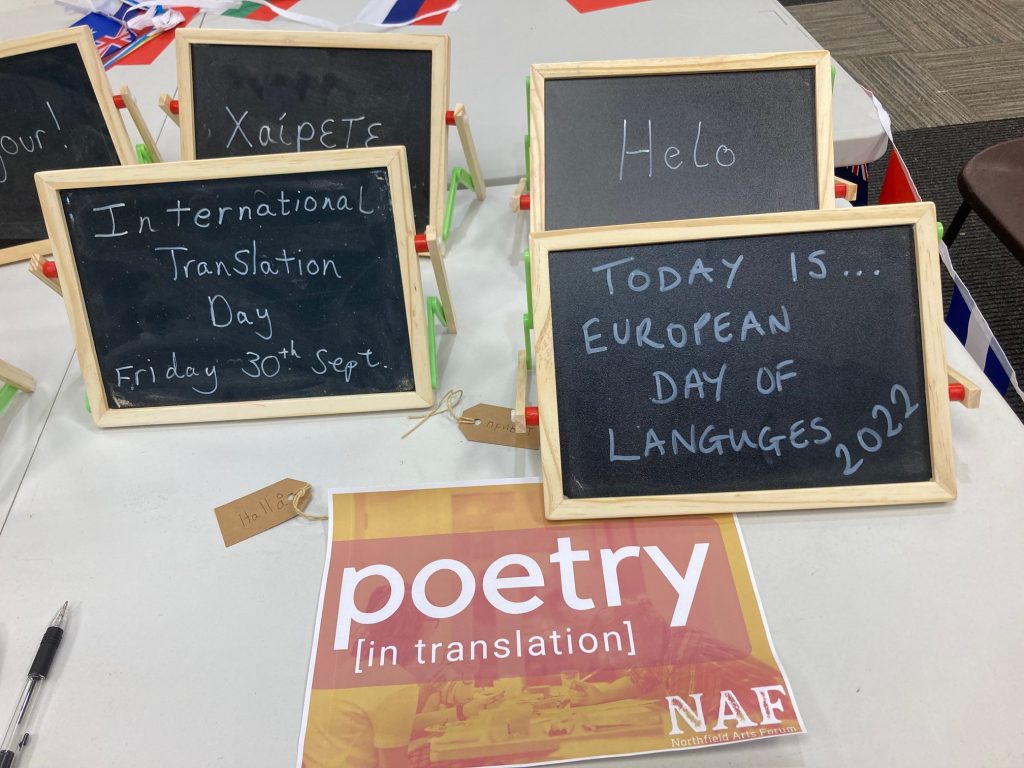

Heritage translation project I had previously been involved with a heritage translation project during my MA, working with Sandwell Archives and wanted to find a heritage project that would involve the Aston students and enable the local community to see how languages played a role in their local industrial history. After unsuccessfully scouring online archives, I contacted the Stourbridge Glass Museum, knowing that there were links between the Huguenots and the local glass industry. They were in the process of reclassifying their library, which includes a huge number of foreign language books. Three of the students worked on translations of extracts in Spanish, Chinese and Danish, hopefully providing materials for a future museum display on the history of glassmaking around the world. Sadly, the archives did not hold any documents about the Huguenot influence but a final visit to Dudley Archives in January 2023 revealed a letter dated July 1914, from a German company, Diedr. Lindemann, breaking off commercial ties with Stevens and Williams (Royal Brierley Crystal), accusing the English government of spreading lies about the war and about ‘German successes up to now’. The letter was accompanied by four propaganda leaflets, three in English and one in French, with accounts of various incidents during WW1, all told from the German perspective. The French publication became the focus of a translation project with Aston’s final year and MA students. Sue Campbell (the Aston Translation Studies lead) and I incorporated the project into the Spring semester’s timetable, including three weeks of teaching. The people of the Black Country are hugely proud of their local heritage, and it was a pleasure to share previously unknown documents with the local community through the presentation of the project to the Glass Museum and Dudley Archives in September 2023 and March 2024.
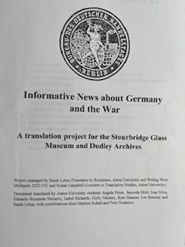
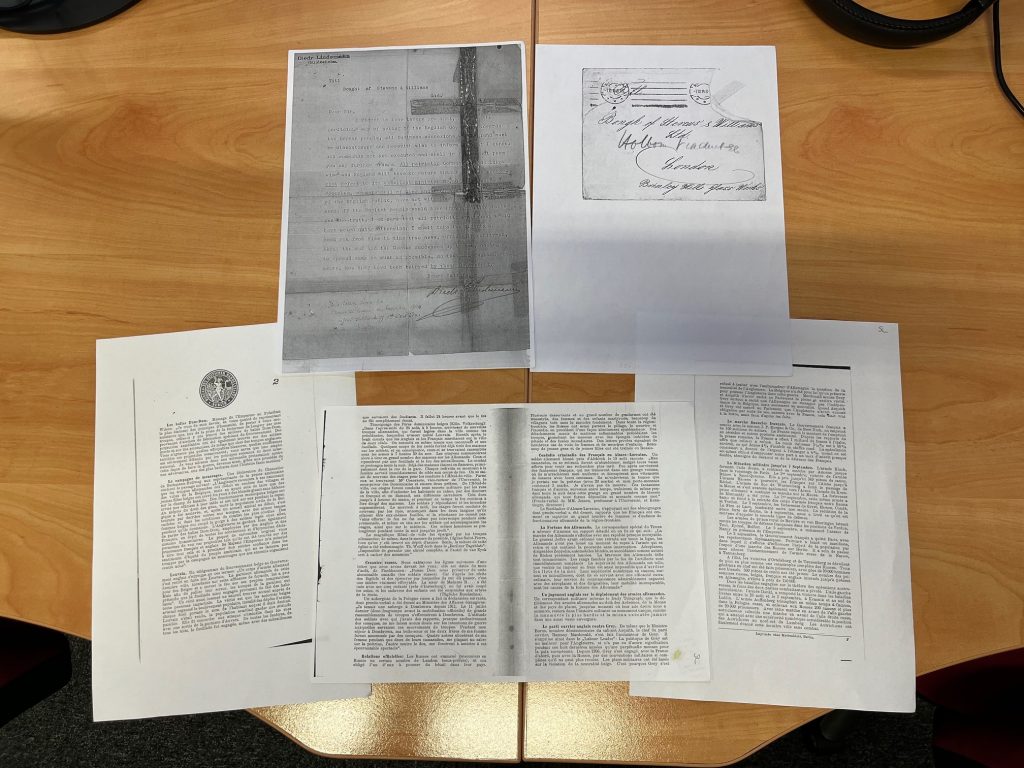
Writing West Midlands
In July 2022, as part of the National Writers Conference at the University of Birmingham, I was invited to speak about ‘Being in Residence – advice on finding residencies for writers and translators’ alongside a local Poet in Residence. This was followed in October by the Birmingham Literature Festival where we held two translation-based activities in the foyer of The Rep theatre, with attendees invited to bring extracts of their work to our ‘Translation Station’, where they could have their work translated into another language. We had a team of translators, including students from Aston University and the University of Birmingham alongside professional translators. Languages available were French, German, Spanish, Chinese, Japanese and Arabic, and a wide range of texts including Lady Gaga lyrics, poetry and children’s literature were translated. There was also a ‘running’ translation station in French, German and Spanish, where attendees could simply watch a translator at work on a big screen, seeing the translated text develop and change, and chat with the translator about the decisions being made. One translator showcased CAT tools, generating conversations about whether AI would ever replace writers/translators and if they are appropriate for literary translation.
Other smaller events included interviewing Serbian writer Emilya Milicevic about her self-translated book, a series of seven short stories called The Small Home Pharmacy (pub. Nova Poetika) as part of the Birmingham Literary Salon, drilling down into her writing methods (which include using colour-coded spreadsheets) and sharing her work in both Serbian and English. I was also able to join forces with a Birmingham-based independent bookshop to write short reviews/recommendations of translated literature for their social media posts. Books reviewed included Grown Ups by Marie Aubert, Animal Life by Audur Ava Olafsdottir and Urgent Matters by Argentinian writer Paula Rodriguez amongst others. Finally, to mark International Translation Day, I joined forces with translators in residence from the North East and Oxford to hold a session on Eventbrite to present and discuss our residencies with a wider audience.
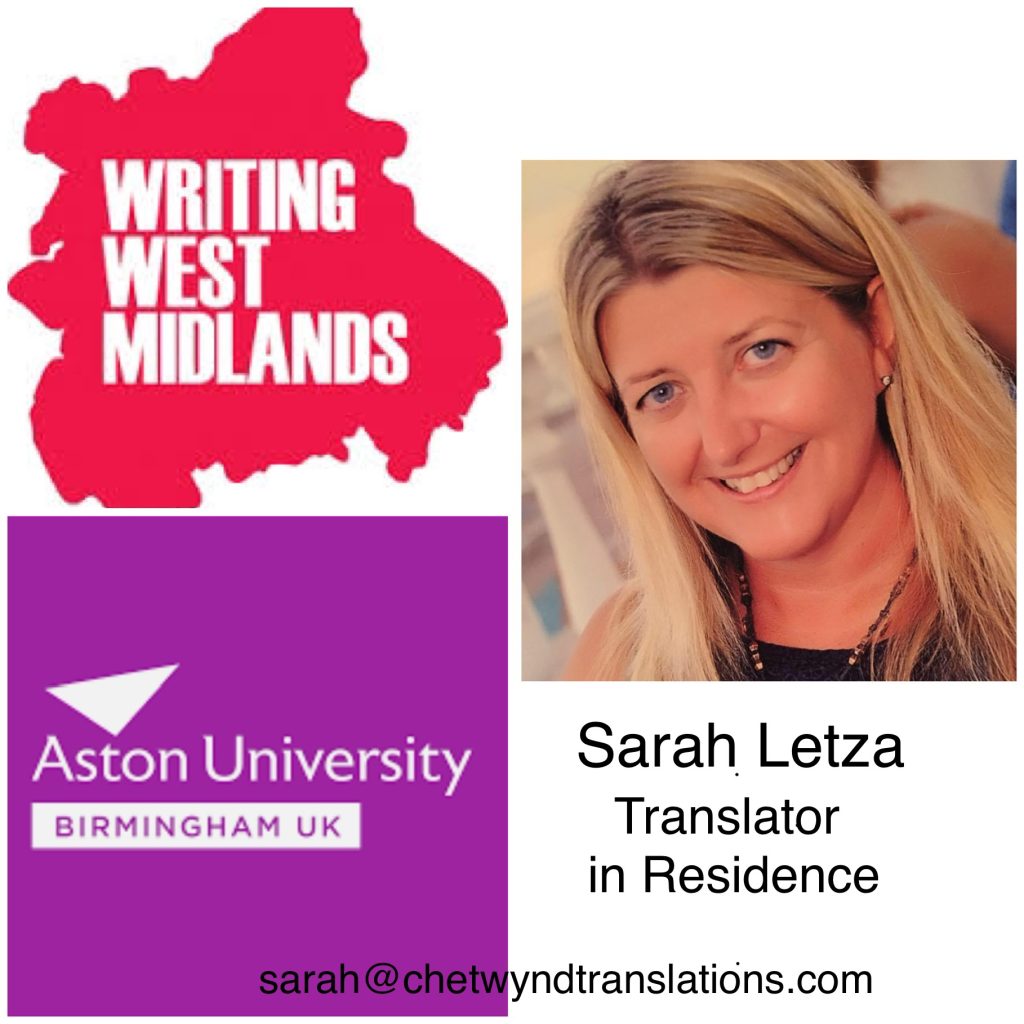
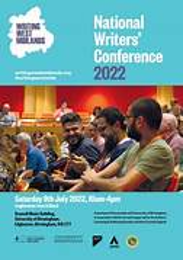
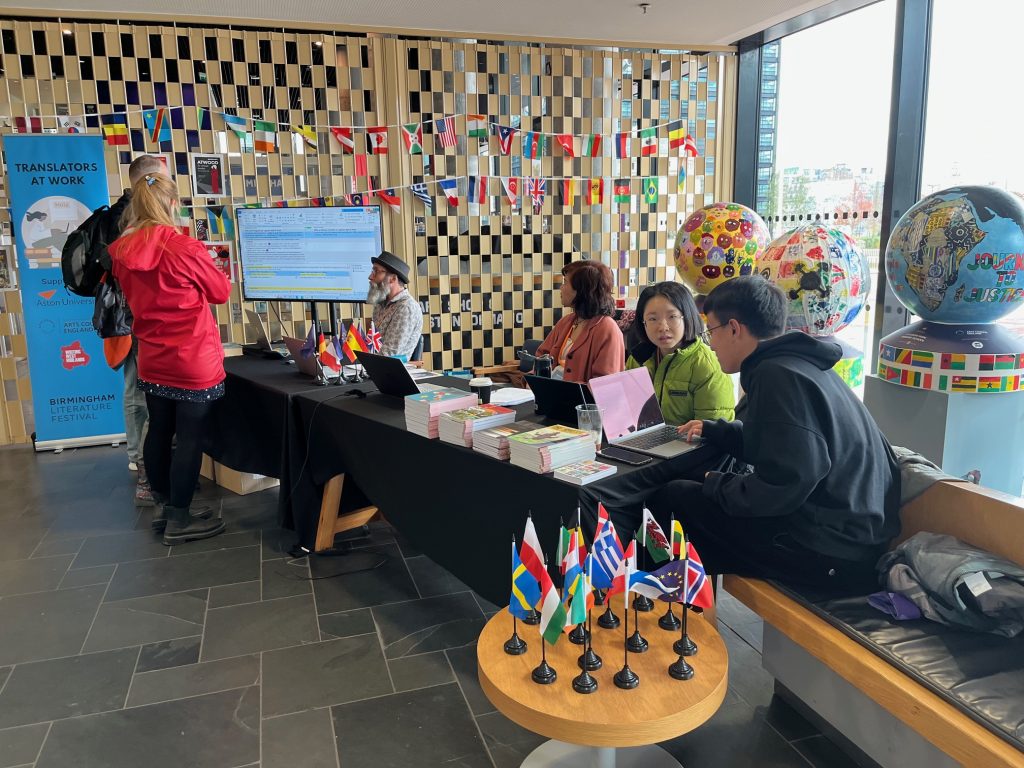
Languages are all around
The feedback from each strand was incredibly positive. The strands intentionally ensured that all age groups could be involved, from the youngest participant at NAF at 8 years old to the older generation who will eventually read about the Glass Museum project in the future both in the press and at the museum itself. Public events revealed that, although many people read translated literature, they are often oblivious to the fact that it is a translated text. People were consequently fascinated by the translation process and were keen to get recommendations and ideas. From the perspective of the translation workshops, younger participants were both amazed and proud that they finished the session having translated a poem/rhyme from a language with which they had never previously had contact, often asking why they didn’t do similar activities at school. The high levels of engagement for an activity that is relatively ‘niche’ and in which they were not obliged to take part was lovely to see. The college students were both engaged and engaging, and many were unaware of the breadth of specialisations and opportunities that a career in translation can offer. This sort of collaboration is key to reversing the current decline in the uptake of languages in the UK. My contribution was small but, I hope, impactful, encouraging people to ‘think like a linguist’, to appreciate translated literature and to encourage the valuing of languages in future generations.
Sarah Letza is a freelance translator working from French to English. She is currently an Associate with the Steven Spender Trust and is coordinator of the ITI West Midlands Group.
